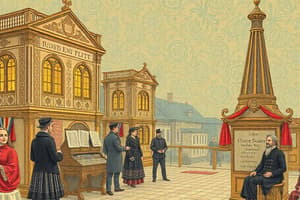Podcast
Questions and Answers
Who focused on the 'glue' which holds society together?
Who focused on the 'glue' which holds society together?
- Karl Marx
- Max Weber
- C.Wright Mills
- Emile Durkheim (correct)
What did Karl Marx consider to be the most important determinant for society?
What did Karl Marx consider to be the most important determinant for society?
Economics
What concept did Max Weber create for understanding society?
What concept did Max Weber create for understanding society?
Verstehen
What did Max Weber study in relation to capitalism?
What did Max Weber study in relation to capitalism?
What does C.Wright Mills believe is necessary to study society effectively?
What does C.Wright Mills believe is necessary to study society effectively?
What is the most important concept C.Wright Mills believed about society?
What is the most important concept C.Wright Mills believed about society?
What method did Clifford Geertz advocate for understanding symbols in life?
What method did Clifford Geertz advocate for understanding symbols in life?
What aspect of modern societies did Karl Marx argue was most important?
What aspect of modern societies did Karl Marx argue was most important?
What did Emile Durkheim believe about the functions of society?
What did Emile Durkheim believe about the functions of society?
What condition did Emile Durkheim describe as feeling lost in society?
What condition did Emile Durkheim describe as feeling lost in society?
What concept did Max Weber create to explain societal tools?
What concept did Max Weber create to explain societal tools?
How did Clifford Geertz perceive culture?
How did Clifford Geertz perceive culture?
What types of decisions did Max Weber categorize?
What types of decisions did Max Weber categorize?
Flashcards are hidden until you start studying
Study Notes
Emile Durkheim
- Focused on social cohesion, emphasizing the role of rituals in uniting society.
- Introduced the concept of "anomie," describing a state of normlessness leading to feelings of disconnection.
- Identified "manifest" and "latent" functions of social phenomena, highlighting unintended consequences.
Karl Marx
- Argued that economics is the primary social determinant influencing society.
- Stressed the importance of class struggle as a catalyst for societal revolution and change.
- Discussed alienation in the workplace, advocating for the development of class consciousness among workers.
Max Weber
- Proposed the concept of "verstehen," stressing the need to understand individuals' perceptions in analyzing society.
- Suggested that cultural factors, exemplified by Puritan ideals, significantly influence economic systems.
- Developed the idea of "ideal types" as tools for social scientists to explain societal phenomena.
- Categorized human decisions into four types: value-oriented, goal-oriented, emotional, and traditional.
C. Wright Mills
- Advocated for the development of "sociological imagination" to effectively study society.
- Emphasized the interconnectedness of history and biography as key elements in understanding societal dynamics.
Clifford Geertz
- Promoted "thick description" as a methodological approach to uncover the social significance of symbols in daily life.
- Viewed culture as semiotic, emphasizing the interpretation of symbols in understanding societal structures.
Studying That Suits You
Use AI to generate personalized quizzes and flashcards to suit your learning preferences.




